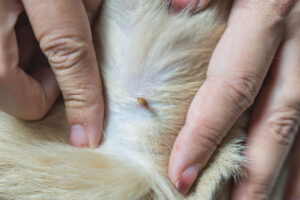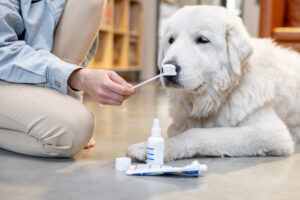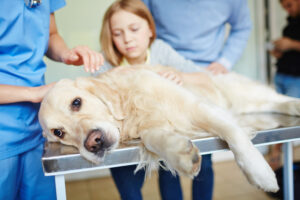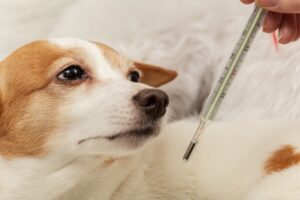Pet Safety Around Florida’s Coastal Areas: How to Protect Your Best Friend
 Florida’s beaches are a pet paradise, but only if you know what to watch for. The coast is full of surprises: saltwater hazards, heatstroke risks, sharp debris, and marine wildlife can all turn a perfect day into an emergency. Here’s what every Tampa Bay pet owner should know before heading to the sand.
Florida’s beaches are a pet paradise, but only if you know what to watch for. The coast is full of surprises: saltwater hazards, heatstroke risks, sharp debris, and marine wildlife can all turn a perfect day into an emergency. Here’s what every Tampa Bay pet owner should know before heading to the sand.
Saltwater Isn’t Safe to Drink
Dogs are natural explorers and often gulp down ocean water if you’re not careful. That can lead to salt poisoning, which happens fast. Watch for vomiting, diarrhea, weakness, confusion, or even seizures. The fix is simple. Always bring plenty of fresh water and a bowl, and offer it often. If your pet drinks saltwater and starts acting strangely, call your veterinarian immediately.
Heatstroke and Hot Sand
Florida sun and humidity can overheat pets in minutes. Flat-faced breeds and seniors are especially at risk, but any pet can collapse on a hot day. Look for rapid panting, drooling, red gums, vomiting, or stumbling. Sand can burn paws quickly. If you can’t hold your hand on the sand for five seconds, it’s too hot for your pet.
Plan your beach visits for early morning or late evening. Find shade, take breaks, and keep your pet hydrated. If you see signs of heatstroke, move your pet to a cool spot, offer water, and call your vet.
Hidden Hazards in the Sand
Beaches hide plenty of sharp shells, glass, and fishhooks. Just one sprint or dig can mean a cut paw or worse. Some dogs swallow sand while playing, which can block their intestines and lead to illness.
Scan the sand before letting your pet roam. Rinse their paws after every visit to remove salt and debris. If you notice limping, licking, or swelling, check their paws and contact your veterinarian if needed.
Wildlife Encounters
Florida beaches and shallow waters are home to jellyfish, stingrays, and more. Even dead jellyfish can sting. Stingrays may hide just beneath the surface and lash out if stepped on. In marshy areas, snakes and alligators can also be a threat.
Keep your pet leashed near the water and steer clear of washed-up sea life. If your pet is stung or bitten, skip home remedies and get veterinary help right away.
Red Tide and Water Quality
Red tides and harmful algae blooms are common along the Gulf Coast. Pets exposed to contaminated water or air may cough, drool, vomit, or develop tremors. If you see dead fish, red water, or posted warnings, skip the beach.
Check water conditions online before you go, and never let your pet swim in or drink from water that looks questionable.
Essential Beach Day Prep
Pack fresh water, a bowl, a sturdy leash, and a pet life vest if your dog swims. Use pet-safe sunscreen for light or short-haired pets. Carry a basic first-aid kit with bandages and vinegar for jellyfish stings. Make sure ID tags are up to date and your vet’s number is in your phone.
Takeaway for Tampa Bay Pet Owners
Stay alert and prepared so your beach day ends with happy memories, not a trip to the animal hospital. If you have questions or need advice, Affordable Pet Hospital is here to help. Schedule an appointment online or call 813-991-9898 to keep your best friend safe all year long.

 Florida’s endless sunshine and gentle winters make outdoor adventures with pets a year‑round pleasure. Unfortunately, the same mild temperatures and high humidity also create ideal breeding grounds for fleas, ticks, mosquitoes, and the intestinal worms they carry. Because there is no natural “off‑season,” dogs and cats in the New Tampa area face parasite exposure every month of the year. The good news: consistent prevention, routine veterinary screening, and a few household habits can keep pets comfortable and parasite‑free.
Florida’s endless sunshine and gentle winters make outdoor adventures with pets a year‑round pleasure. Unfortunately, the same mild temperatures and high humidity also create ideal breeding grounds for fleas, ticks, mosquitoes, and the intestinal worms they carry. Because there is no natural “off‑season,” dogs and cats in the New Tampa area face parasite exposure every month of the year. The good news: consistent prevention, routine veterinary screening, and a few household habits can keep pets comfortable and parasite‑free. As a conscientious pet owner, you want to do everything in your power to keep your furry friends healthy and safe. Parasites such as fleas, ticks, and heartworms pose significant health risks to pets, potentially leading to severe illnesses or even death in severe cases. Putting a comprehensive parasite prevention plan into action is essential for maintaining your
As a conscientious pet owner, you want to do everything in your power to keep your furry friends healthy and safe. Parasites such as fleas, ticks, and heartworms pose significant health risks to pets, potentially leading to severe illnesses or even death in severe cases. Putting a comprehensive parasite prevention plan into action is essential for maintaining your  When it comes to pet care, dental health is often overlooked. However, just like humans, pets require proper oral hygiene to maintain overall health and prevent serious medical issues. Poor dental care can lead to painful infections, tooth loss, and even organ damage if bacteria from the mouth enter the bloodstream. February is
When it comes to pet care, dental health is often overlooked. However, just like humans, pets require proper oral hygiene to maintain overall health and prevent serious medical issues. Poor dental care can lead to painful infections, tooth loss, and even organ damage if bacteria from the mouth enter the bloodstream. February is  As our beloved pets age, their needs evolve, requiring attentive care to ensure they enjoy a comfortable and healthy life in their senior years. Recognizing and addressing these changing needs can significantly enhance their quality of life. Let’s talk about how to
As our beloved pets age, their needs evolve, requiring attentive care to ensure they enjoy a comfortable and healthy life in their senior years. Recognizing and addressing these changing needs can significantly enhance their quality of life. Let’s talk about how to  As loving pet parents, we keep a close eye on our furry companions and ensure their well-being. Sometimes, it can be hard to determine if a new behavior or symptom warrants
As loving pet parents, we keep a close eye on our furry companions and ensure their well-being. Sometimes, it can be hard to determine if a new behavior or symptom warrants  If you’ve ever gone through a stressful event, you likely know firsthand that stress can cause humans to exhibit some strange behaviors. If that stress continues unchecked for an extended period of time, it can begin to have both mental and physical consequences. This is also true for our furry friends. Dogs and cats can also experience stress and anxiety, but since they cannot verbally express their feelings, it can be quite difficult to identify what is causing their sudden odd behavior. In this post, we’ll talk about the science behind stress in pets, how to identify a stressed or anxious pet, and
If you’ve ever gone through a stressful event, you likely know firsthand that stress can cause humans to exhibit some strange behaviors. If that stress continues unchecked for an extended period of time, it can begin to have both mental and physical consequences. This is also true for our furry friends. Dogs and cats can also experience stress and anxiety, but since they cannot verbally express their feelings, it can be quite difficult to identify what is causing their sudden odd behavior. In this post, we’ll talk about the science behind stress in pets, how to identify a stressed or anxious pet, and  As the holiday season approaches, homes all over Florida are filled with festive decorations, mouth-watering treats, and the joyful spirit of celebration. However, amidst these holiday delights, it’s crucial for pet owners to be mindful of potential hazards that could affect their furry friends. In this post, we’ll explore some common holiday pet hazards and provide essential safety tips to keep your pets safe and happy.
As the holiday season approaches, homes all over Florida are filled with festive decorations, mouth-watering treats, and the joyful spirit of celebration. However, amidst these holiday delights, it’s crucial for pet owners to be mindful of potential hazards that could affect their furry friends. In this post, we’ll explore some common holiday pet hazards and provide essential safety tips to keep your pets safe and happy. As the cooler months roll in, we see more and more pets coming into the office with common winter illnesses. Even though our winters don’t get so cold here, pet owners must still be diligent about monitoring their pets for symptoms. In this post, we’ll explore a few of the most common pet illnesses during winter and how to handle them.
As the cooler months roll in, we see more and more pets coming into the office with common winter illnesses. Even though our winters don’t get so cold here, pet owners must still be diligent about monitoring their pets for symptoms. In this post, we’ll explore a few of the most common pet illnesses during winter and how to handle them. Ringworm
Ringworm